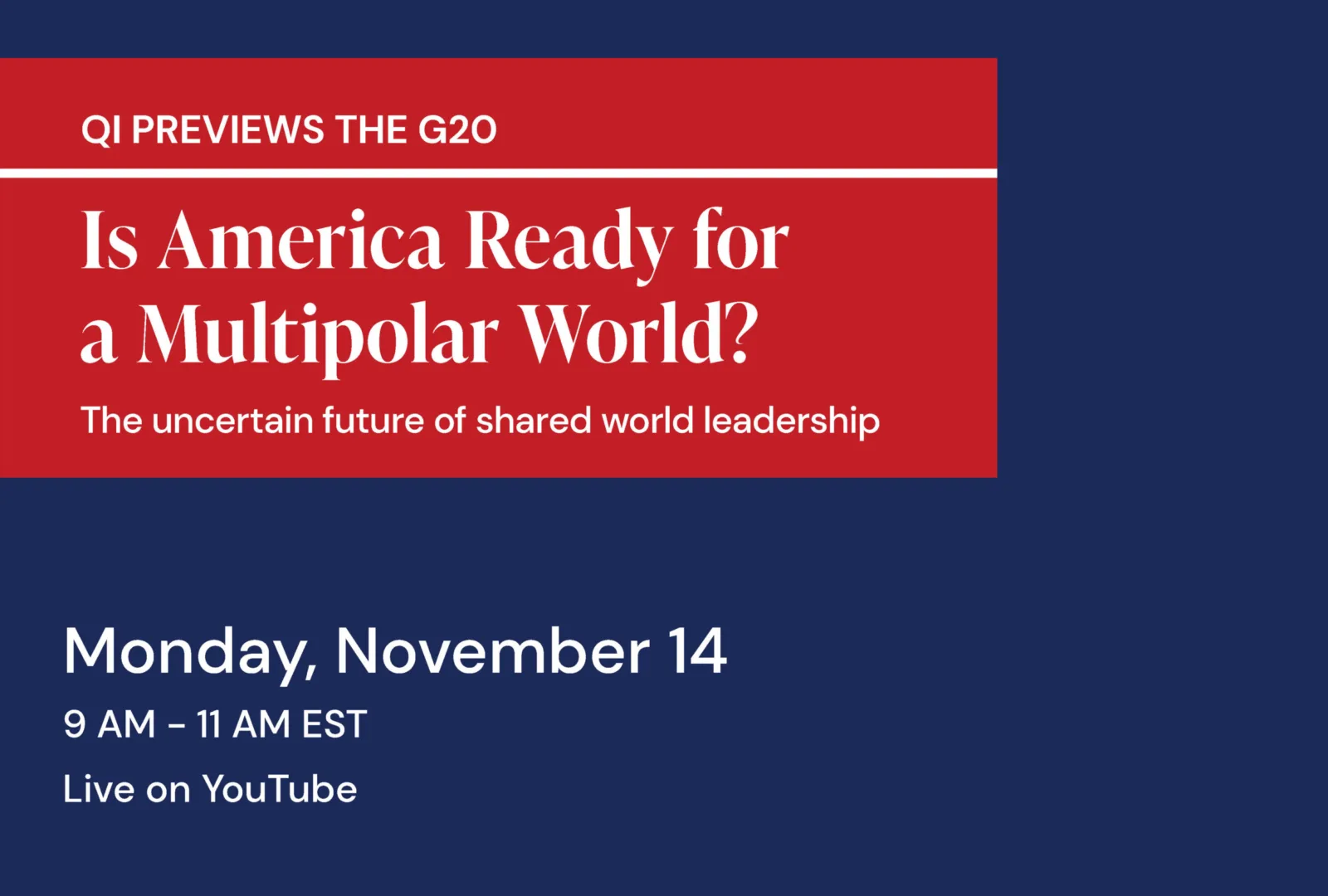Is America Ready for a Multipolar World?
QI Previews the G20
“Is America Ready for a Multipolar World?”
Monday, November 14 from 9AM – 11AM (EST)
The United States’ position as the world’s sole superpower appears to be slipping. Chinese power and reach continues to grow. Much of the Global South has adopted an independent position on the response to Russia’s invasion of Ukraine as well as on America’s effort to contain China’s growth and influence. As world leaders gather at the G20 summit in Bali, America’s power and purpose is at a crossroads. Challengers of U.S. power – such as Russia’s Putin – welcome a new world order. Does that mean, however, that America should seek to restore American primacy through military dominance? Is this even possible? Or is America better off shifting strategy toward managing a world of shared leadership?
Panelists

Celso Amorim
Celso Amorim is the former Brazilian Minister of Defense, serving under President Rousseff from 2011-2014. He previously served as the Minister of External Relations under President Lula da Silva from 2003-2010. As a career diplomat, Amorim was Ambassador of Brazil to the United Kingdom from 2001 to 2002, Permanent Representative of Brazil to the United Nations and the World Trade Organization in Geneva from 1999 to 2001, Permanent Representative of Brazil to the United Nations, in New York, from 1995 to 1999, and Permanent Representative of Brazil to the UN, GATT and the Conference on Disarmament, in Geneva, from 1991 to 1993.

Gérard Araud
Gérard Araud is a Senior Advisor at Albright Stonebridge Group (ASP). He previously served as a French diplomat for more than three decades, earning the highest rank in the French diplomatic service, “Ambassadeur de France.” His service included serving as Ambassador of France to the United States from 2014 to 2019. Araud also held numerous other senior positions within the French Ministry of Foreign Affairs and International Development, including Director General for Political Affairs and Security and Director for Strategic Affairs, Security, and Disarmament (2000-2003). He also served as the French negotiator on the Iranian nuclear issue from 2006 to 2009.

David Kang
David C. Kang is a Non-Resident Fellow at the Quincy Institute and Maria Crutcher Professor of International Relations at the University of Southern California, with appointments in the Department of Political Science and International Relations, East Asian Languages and Cultures and in the Marshall School of Business. Kang is also director of the USC Korean Studies Institute and Vice-Chair of the Political Science and International Relations department. Kang’s latest book is State Formation through Emulation: the East Asian Model, coauthored with Chin-Hao Huang (Cambridge University Press, forthcoming).

Kishore Mahbubani
Kishore Mahbubani is a distinguished fellow at the National University of Singapore (NUS). He was formerly the Dean of the Lee Kuan Yew School of Public Policy at NUS. Concurrently, Prof Mahbubani serves in the Boards and Councils of institutions around the world, including the Yale President's Council on International Activities (PCIA), University of Bocconi International Advisory Committee, and as Chairman of the Lee Kuan Yew World City Prize Nominating Committee. Before that, he enjoyed a long career with the Singapore Foreign Service from 1971 to 2004. He had postings in Cambodia (where he served during the war in 1973-74), Malaysia, Washington D.C and New York, where he served two stints as Singapore’s Ambassador to the UN and as President of the UN Security Council in January 2001 and May 2002. He was Permanent Secretary at the Foreign Ministry from 1993 to 1998.

Naledi Pandor
Naledi Pandor is the Minister for International Relations and Cooperation for the Republic of South Africa. She has served as a cabinet minister in the South African government since 2004, previously serving as Minister of Education (2004 – 2009), Minister of Science and Technology (2009 –2012), Minister of Home Affairs (2012 – 2014), Minister of Science and Technology (2014 – 2018) and Minister of Higher Education and Training (2018 – 2019). Dr Pandor has taught at several institutions in South Africa, such as the Ernest Bevin School, Taung College of Education, University of Bophuthatswana, and the University of Cape Town.

Katrina vanden Heuvel
Katrina vanden Heuvel is a QI board member and editorial director and publisher of The Nation. She served as editor of the magazine from 1995 to 2019. She currently writes a weekly column for The Washington Post and is a commentator on U.S. and international politics for MSNBC, CNN, and PBS. Vanden Heuvel is the author of The Change I Believe In: Fighting for Progress in the Age of Obama, and co-author (with Stephen F. Cohen) of Voices of Glasnost: Interviews with Gorbachev’s Reformers. During her tenure, The Nation’s journalism has been recognized for excellence by the National Magazine Awards, the Society of Professional Journalists, the Maggie Awards, GLAAD, and the National Association of Black Journalists, among others. She also serves as President of the American Committee for US-Russian Accord (ACURA).
